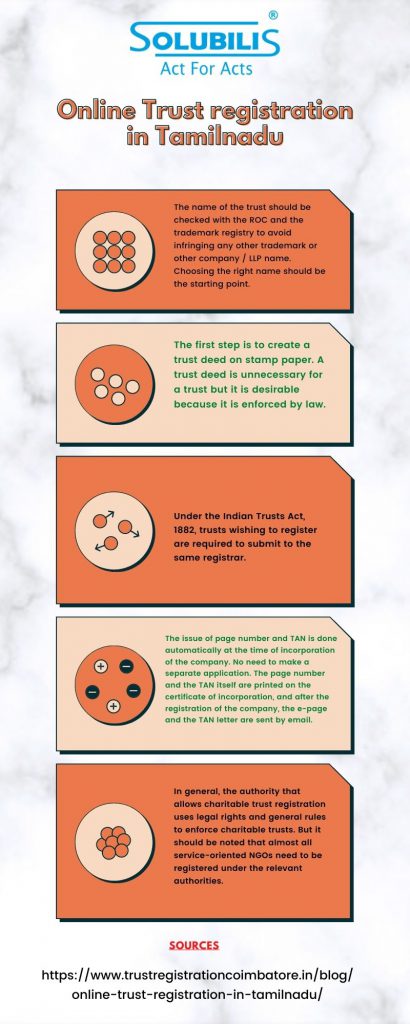Charitable trust, as the name suggests, is where the sole purpose of its inclusion is for lifting people out of poverty, women empowerment. Also for eradicating illiteracy, promoting public health and comfort, religious practices and other charitable purposes. Trust registration is beneficial and philanthropic purposes have no necessarily service-oriented; unless they are specifically for the benefit of the public or a group of people.
Legislation governing the trust
A trust in India has the governance by the Indian Trusts Act, 1882. However, each state of India can create its own Trusts Act to govern non-profit organizations such as trusts.
Next, the trust can also receive projects and funds like the society. However, getting projects and funds immediately after trust registration in India is very challenging. Register.
Therefore, in order to obtain or fund projects, the trust needs to meet certain minimum eligibility criteria. Such criteria may include performance related to trust, experience, age and other required parameters. Moreover, a public charitable trust in India should have registration with the office of the Charity Commissioner; who has jurisdiction over the public trust.
Online Trust registration

Name selection
The name of the trust should have checked with the ROC and the trademark registry to avoid infringing; any other trademark or other company / LLP name. Choosing the right name should be the starting point.
Draft Deed
The first step is to create a trust deed on stamp paper. A trust deed is unnecessary for a trust but it is desirable because it has enforcement by law.
Trust Registration
Under the Indian Trusts Act, 1882, trusts wishing to register are necessary to submit to the same registrar.
PAN, TAN AND BANK A / C
The issue of page number and TAN is done automatically at the time of incorporation of the company. No need to make a separate application. The page number and the TAN itself are printed on the certificate of incorporation; and after the registration of the company, the e-page and the letter for TAN are sent by email.

Changes in Charitable trust under income tax
- Under section per of the Indian Trusts Act, trust is an obligation attached to the ownership of property has also accepted by the owner; or declared by him and accepted by him, or for the benefit of another.
- In short, trust creates a legal relationship and no jurisprudential entity. If such trust is of charitable nature i.e. Public Charitable Trust (PCT), the income derived from the property of the trust is exempt from income tax under the scope of Section 11 of the Act. However, in order to be eligible for a waiver claim, the trust must be registered under Section 12AA of the Act.
- In addition, some sections under section 10 (23C) provide exemptions to the various institutions referred to therein.
- However, the view regarding the registration of such trusts or institutions under the Income Tax Act in this budget has changed dynamically.
- According to the Finance Act, 2020 came into force on June 1, 2020. However, due to unexpected situation caused by Covid-19, the applicable period has postponed to October 1, 2020.
- A change in the registration process for a charitable trust to take advantage of Section 11 of the law is very important. Section 12A of the Act, which states the applicable conditions of Sections 11 and 12, has amended to include section (AC), which, along with anything contained in Sections (a) to (ab), states that a trust or institution Apply with the Principal Commissioner.
- Section 12 has also amended to make it clear that when an already registered organization has registration under section 12A or 12AA, and has now registered under section 12AB, the provisions of section 11 and 12 shall apply from date. Previous registration
- In addition, when a trust or organization has permanently registered under Section 12 AAB and subsequent specific registration has been approved, the provision of Sections 11 and 12 shall come into force from the date of registration.
- It is also justified that section 12AA has amended to include a sun-set clause that this section will cease to function from June 1, 2020, after which section 12AB will govern the registration process.

However, the registration process under Section 80G has also amended with the same effect as Section 12 AAB. And except for points or except in the table above section 10 (3 above C), the same does not apply to registration under section 80G.
Benefits of charitable trust
Charitable trusts have often organized by people who seek to engage in charitable activities for the benefit of their heirs . Other leading reasons for which a trust has been established are the benefits of tax exemptions. Non-profit organizations are an excellent example of a charitable trust. However, these benefits can only have obtained when the charitable trust acts as a legal entity. This is probably the primary benefit of trust registration.
Legal guidelines for guiding charities
In India, federal and state law departments have developed legal guidelines to guide charities and the general public. This process is to help aid seekers (especially donors) who want to transfer their assets; to a trust for additional tax benefits. In this way, these donors can save a large amount which can later have transfer to legal heirs.
Long-term tax benefits
This is the main reason for such an investment where donors can get long-term tax benefits through continuous donations to a reputable trust organization. To register a charitable trust, the person must obtain the necessary information about the establishment of a new trust. Both the state and federal authorities have their own legal roadmap that serves a purpose. Special laws such as the Trust Act 1882 [1] have been established and promulgated to encourage the registration process.
Legal rights
In general, the authority that allows charitable trust registration uses legal rights and general rules to enforce charitable trusts. But it should have notice that almost all service-oriented NGOs need to be registered under the relevant authorities.

